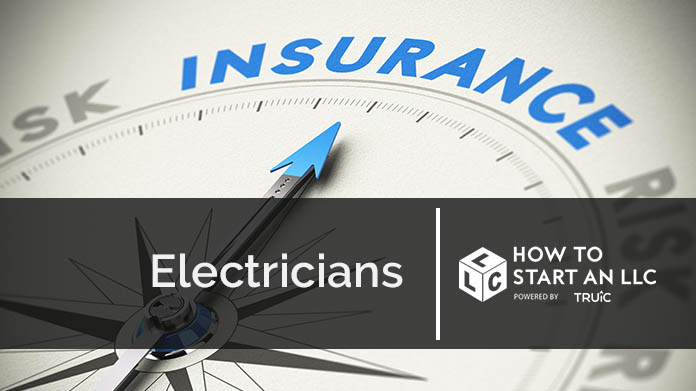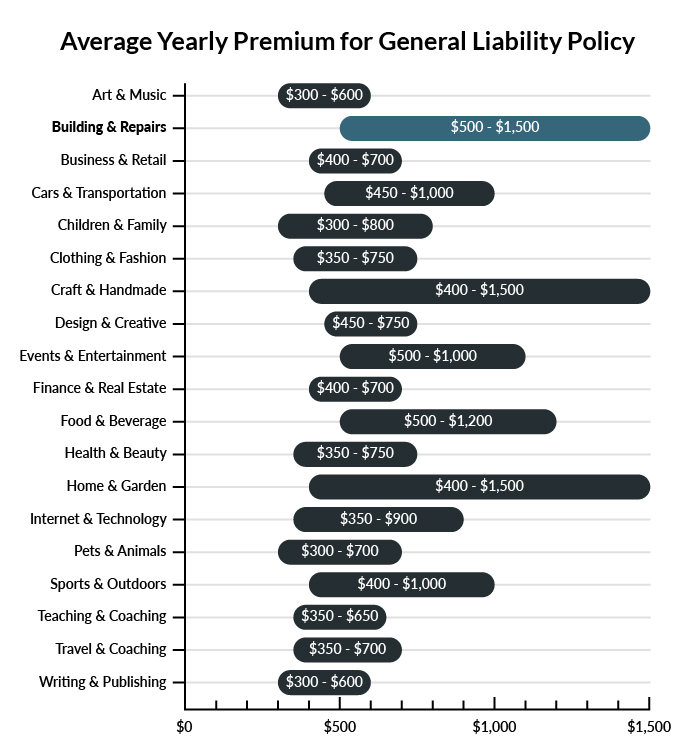Electrician Business Insurance
Getting insurance for your electrician business is essential.
Electrician businesses need to be protected from various forms of potential liability, such as product liability, breaches of contract, and intellectual property infringement.
For example, one of your employees negligently installs electrical equipment and injures a customer, or a product you install turns out to be faulty.
We’ll help you find the most personalized and affordable coverage for your unique business.

Recommended: Ergo Next Insurance is dedicated to matching small businesses with the right policy at the best price.
Best Insurance for an Electrician
General liability insurance is — generally speaking — one of the most important insurance policies for electrician businesses.
Some of the risks general liability insurance covers are:
- Bodily injury
- Property damage
- Medical payments
- Legal defense and judgment
- Personal and advertising injury
In addition to general liability insurance, many electricians carry additional policies to cover specific situations that are excluded from general liability. For example:
- Workers’ compensation insurance
- Commercial auto insurance
- Product liability insurance
- Commercial umbrella insurance
When you’re shopping for insurance, be aware that you’ll find two distinct types of insurers: online and traditional. Online insurers sell policies on the internet, don’t have physical offices that customers visit, and don’t use agents. Instead, they use AI to customize and sell policies. This means they can offer much lower price points for the same quality coverage. We recommend online insurers for most small businesses.
By contrast, traditional insurers employ agents to sell policies from physical offices. They have higher overhead and thus higher costs, plus they’re slower than online insurers. Still, traditional insurers have their place if they’re in your budget, as they offer high-quality coverage and have a lot of experience.
Let’s Find the Coverage You Need
The best insurers design exactly the coverage you need at the most affordable price.
Cost of General Liability Insurance
The average electrician in America spends between 500-$1,500 per year for $1 million in general liability coverage.
Compare the average cost of general liability insurance for an electrician business to other professional industries using the graph below.
Several factors will determine the price of your policy. These include your:
- Location
- Deductible
- Number of employees
- Per-occurrence limit
- General aggregate limit
You may be able to acquire general liability insurance at a discounted rate by purchasing it as part of a business owner’s policy (BOP) rather than as a standalone policy.
A BOP is a more comprehensive solution that includes multiple forms of coverage, such as business interruption and property insurance.

Find the Best Rate
Discover the best coverage at the lowest rate in our cheapest business insurance review.
Common Situations That General Liability Insurance May Cover for an Electrician
Example 1: You accidentally start a fire during some repairs, and it spreads rapidly through a client’s living room, damaging furniture and electronics worth thousands of dollars. General liability insurance would likely cover some of what your business owes in damages or any settlement reached.
Example 2: During a repair, a customer’s unattended child touches a live wire and suffers severe injuries. If found liable, your business would probably be covered for some of the resulting damages or any settlement reached between you and the customer.
Example 3: You decide to take a lunch break while repairing some wiring in a customer’s house. After eating, you accidentally leave a bar of dark chocolate on the floor. The client’s dog sneaks in and eats the entire thing, becoming seriously ill. If held liable, your business would probably have some coverage under a general liability insurance policy for damages incurred or a settlement reached outside of court.
Other Types of Coverage Electricians Need
While general liability is the most important type of insurance to have, there are several other forms of coverage you should be aware of. Below are some of the most common types of coverage:
Professional Liability Insurance
In the event that your services are deemed unsatisfactory, you can find your business confronted with a suit alleging professional negligence. Instead of paying damages out of your business’s profits, a professional liability policy can cover a good chunk of whatever figure you end up having to pay.
Commercial Property Insurance
Your electrician operation will no doubt require expensive professional equipment, tools, and machinery to help you get the job done. You cannot afford to lose these assets to an unpredictable disaster like fire or violent weather. Acquire a commercial property policy to protect your business’ materials, including equipment, tools, machinery, vehicles, and any owned real estate.
Commercial Auto Insurance
If you have a vehicle that is driven primarily for business use, you’ll need to pick up commercial auto insurance to stay covered for accidents that happen while on the road.
Workers’ Compensation Insurance
If you decide to hire any part-time or full-time employees, most states legally require you to have workers’ compensation insurance. This covers costs related to injuries that an employee suffers while working.
Additional Steps To Protect Your Business
Although it’s easy (and essential) to invest in business insurance, it shouldn’t be your only defense.
Here are several things you can do to better protect your electrician business:
- Use legally robust contracts and other business documents. (We offer free templates for some of the most common legal forms.)
- Set up an LLC or corporation to protect your personal assets. (Visit our step-by-step guides to learn how to form an LLC or corporation in your state.)
- Stay up to date with business licensing.
- Maintain your corporate veil.
Electrician Insurance FAQ
Yes, absolutely. You will need to first get a quote from an online business insurance provider like Ergo Next Insurance. Ergo Next allows you to then purchase a policy immediately and your coverage will be active within 48 hours.
A typical business owner’s policy includes general liability, business interruption, and commercial property insurance. However, BOPs are often customizable, so your agent may recommend adding professional liability, commercial auto, or other types of coverage to your package depending on your company’s needs.
“Business insurance” is a generic term used to describe many different types of coverage a business may need. General liability insurance, on the other hand, is a specific type of coverage that business owners need to protect their assets.
In general, yes. Business insurance is highly recommended for most companies before they start operating to protect themselves financially from many of the risks inherent in running a business. In addition, most states require commercial auto, workers’ compensation, and/or other forms of insurance for a company to operate legally. Check your state and local regulations to make sure you’re in compliance.
Not necessarily. Certain exceptions may be written directly into your electrician business insurance policy, and some perils may be entirely uninsurable.
Yes, an LLC is meant to create a legal barrier between your business and your personal assets and credit. If you haven’t formed an LLC yet, use our Form an LLC guide to get started.
An LLC doesn’t protect your business assets from lawsuits and liability– that’s where business insurance comes in. Business insurance helps protect your business from liability and risk.